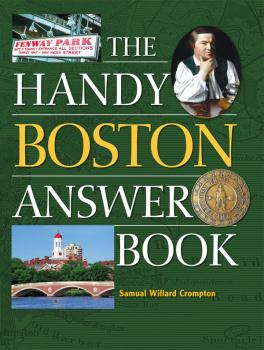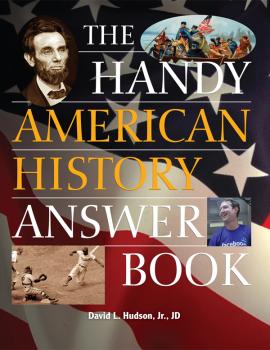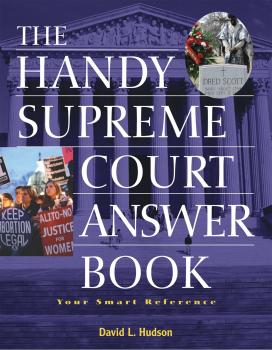ТОП просматриваемых книг сайта:















The Handy Answer Book Series
Скачать книги из серии The Handy Answer Book SeriesАннотация
Whether it's called Beantown, The Olde Towne, Titletown, The Cradle of Liberty, The Athens of America, The Puritan City, The City on a Hill, or any of its other obscure or oft-repeated nicknames, Boston has a long and varied history. Its universities and hospitals lead the nation, and its sports teams, politicians, and colloquialisms continue to captivate. Exploring this city’s fascinating history, people, myths, culture, and trivia, The Handy Boston Answer Book takes an in-depth look at one of America's oldest major cities.Learn about the city’s founding by Puritan settlers, the Boston Massacre, the Great Fire, the opening of the T, the busing desegregation strife, the Big Dig, the local sports fanatics, ethnic enclaves, and the surrounding suburbs, notable sons and daughters, and more are all packed into this comprehensive guide to the city of Boston. Through facts, stats, and history, as well as the unusual and quirky, it answers 1,200 fascinating questions, including What cities and towns comprise the “Greater Boston” region? What do Samuel Adams, James Taylor, Benjamin Franklin, and Taylor Schilling have in common? Are “Tonics” and “Whoopie Pies” available at most “Spas”? What do the colored lights on top of the old Hancock signal?
Аннотация
Whether you are a novice or budding expert, there is much to consider and know when investing: stocks, bonds, mutual funds, real estate, retirement planning, and tax strategies, just for starters. It can all be difficult and confusing. The Handy Investing Answer Book explains, in plain English, the basics of investing. It offers simple investment strategies; investigates common pitfalls; examines concepts of compounding, portfolios and diversification; traces the history of investing; and offers much more to help everyone make wise decisions.The Handy Investing Answer Book explores a variety of investments and their differences, avoiding poor returns and unnecessary risk, understanding financial markets—and how to prevent banks, mutual fund managers and financial advisers getting rich at your expense. Appreciation, dividends, interest, and inflation all effect the value of investments, and this valuable resource looks at handling them to build a successful portfolio for every stage in your financial life. It goes beyond an and introduction to the subject to breakdown complex concepts and definitions into more than 1,400 easy-to-understand answers, such as:Why is dollar cost averaging a beneficial strategy for investing?What is a home equity loan?What are some of the steps to establishing the right goals for investing?What is diversification?What types of risks could we see if we own individual stocks?When did mutual funds start?What is laddering?A glossary of commonly used terms explains key concepts and financial jargon, and helpful financial tables and charts assist with strategies.
Аннотация
Featuring more than 600 questions about dinosaurs—such as What dinosaurs are thought to have evolved into birds? Did dinosaurs travel in herds? and Where and what is the Dinosaur Freeway?—this fun-filled fact-book provides a wealth of information on the lives and habits of these astonishing creatures. From the Tyrannosaurus rex to the Stegosaurus, the guide profiles numerous species, chronicling their time on earth and exploring their roles in archaeological expeditions and museums today. Delightful and intriguing, this comprehensive record includes the debates still surrounding the origins and fate of these creatures that dominated the earth for millions of years but seemed to disappear in the blink of an eye.
Аннотация
Geography is more than just maps and finding your destination. It is about the land, the people on that land, the delicate balance of nature, and our very interdependence upon it, despite the miracles of technology and grocery stores. It’s about the effects of nature on places and people, as well as how politics, borders, cities, and towns affect our lives. The Handy Geography Answer Book traces the history of geography from Eratosthenes and Alexander von Humboldt to latitude and longitude, and the latest advances in the Global Positioning System (GPS). It provides insights into economic, social, historic, culture, religious, political, and climate geography, plus oceanography, demographics, and more.Completely revised and updated, it tours the world, its natural features, and the ever-changing mark humans make on our planet, answering 1,200 questions from the trivia (longest, hottest, tallest) to how geography has influenced history, religion, architecture, and the location of cities, including Who first had the idea that there is a magnetic North Pole? What is interesting about Google’s “Streetview”? How many people are projected to live on the planet in 2050? Which state has the highest annual divorce rate? What are the largest and smallest counties in the U.S.?
Аннотация
Bridging the gap between the entertainment-focused “pop psychology” on television and the dry academic research that is published in journals, The Handy Psychology Answer Book helps answer why humans do what we do through accurate scientific data presented in a lively, accessible, and engaging way. It covers the fundamentals and explains the psychology behind how people deal with money, sex, morality, family, children, aging, addiction, work, and other everyday issues.Fully revised to reflect the latest scientific research—such as the current DSM-5 (Diagnostic and Statistical Manual of Mental Disorders, published by the American Psychiatric Association); the latest neurobiological theories; and the changing face of marriage—this timely reference has expanded to include information sections on the biology and evolution of emotions; technology and adolescence; bisexuality; optimism; autism; as well as a full section on the law, eyewitness testimony and police shootings.Featuring more than 1,500 answers to questions concerning how the human mind and the science of psychology really work such as: How have other cultures addressed psychological issues? Why was Freud so focused on sex? How can I maintain a healthy brain? Is it normal to argue during marriage? Does religion make people happier? How do we reduce social prejudice?
Аннотация
Early civilizations, Native Americans, the English colonies, slavery, the American Revolution, the Declaration of Independence, and the Bill of Rights begin the journey and lay the foundation for the United States of today. The Handy American History Answer Book takes a walk through the economic, political, and social forces, as well as the military conflicts that created, changed, and built the United States. It explains the impact of the biggest events, the wars, the presidents, lesser-known personalities and figures, sports, music, and much more. This handy primer is a captivating, concise, and convenient history of America and Americans.From Washington to the microchip, Columbus to modern terrorist threats, the Anasazi to the iPhone, The Handy American History Answer Book traces the development of the nation, including the impact of the Civil War, the discovery of gold in California, the inventions, the political and economic crises, and the technology transforming modern culture today. It answers nearly 900 commonly asked questions and offers fun facts about American, its history, and people, including What was the Lost Colony? Who were the robber barons? Was the U.S. mainland attacked during World War II? What was Reaganomics? How many states recognize same-sex marriages?
Аннотация
Brutality and fear. Heroism and sacrifice. Military history is a fascinating, complex, and often contradictory subject. War and fighting between tribes, clans, groups and countries has been with us forever. Great leaders, great villains, pivotal moments and events become transformative, causing political, social, and technological upheavals, which were often built on the foundation of war. The Handy Military History Answer Book is a captivating, concise, and convenient look at how the world, the United States, and the lives we lead today have been changed by war and the military. The weapons, leaders, soldiers, battles, tactics, strategies, blunders, technologies, and outcomes are all examined in this powerful primer on the military, its history—and world history.From early Greeks and Romans to Genghis Kahn and other great conquering militaries of the past, continuing on through the civil wars and world wars that shaped the boundaries of today’s nations, and to the modern weapons, technologies, guerrilla warfare, and terrorism currently reported in the nightly news, this book investigates everything from the smallest miscalculations and maneuvers to the biggest invasions and battles, as well as the cutting-edge technologies and firepower that led to victories and helped change the world.The Handy Military History Answer Book looks at the who, the what, the why, and the how of conflicts throughout history. It answers over 1,100 questions, from the mostly widely asked to the more obscure, such as:Who cast the first stone (of human history)?Who were the «Sea Peoples?»Is there anything to the story of Ancient Troy?Could Alexander the Great have conquered the early Roman Republic?How wealthy would each of Alexander's men been had the treasure at Persepolis been divided?How many Romans lost their lives at the Battle of Cannae?Why did people underestimate Julius Caesar when he was in his thirties?How many men, and auxiliary fighters, were there in a Roman legion?Was the Battle of Actium truly decisive? And what way?Which precious metal did the Vikings prefer above all others?Do we even have his name–Genghis Khan–right?Who employed the composite bow with greater effectiveness: the Arabs or the Turks?Why did Pope Urban II go to central France in 1095?Where did Richard the Lion-Heart get his nickname?Why on earth did Hitler code-name his invasion of Russia for a German emperor who drowned?Who was the greater wit: Voltaire or King Frederick the Great?About whom did King George II remark: «Mad, is he? Well I hope he bites some of my other generals?»What great poet spent years gathering food and wine for the Spanish Armada?What was the price for King Francis' freedom, in 1526?How long did it take to learn how to use the longbow?What was the largest of the cannon brought by the Ottoman Turks to the siege of ConstantinopleWho took over when Genghis Khan died (after a fall from his horse)?What did the Franciscan monks say when they returned from Karakorum?Was Napoleon really not French?Who won the Battle of the Nile, and how?Where was the world's first submarine deployed?When did George Washington have to alter all his plans: and how did he go about making the change?How many people died at the Siege of Fort Sumter?What was the worst day of the Civil War, in the Far West?When were balloons first deployed in warfare?Where did the name «Uncle Sam» come from?What signals did Paul Revere watch for on the evening of April 18, 1775?What did Rasputin have to say about the approach of the First World War?How close did Hitler come to victory at Moscow in 1941?What ten days decided the outcome of World War II?What was so special about the B-24?When did the Cold War commence?What was the last action of the Yom Kippur War?What role did Colin Powell play in the run-up to war in Iraq?
Информация о книге
Автор произведения Samuel Willard Crompton
Аннотация
Combining practical legal tips with an exhaustive review of the law in the United States, this comprehensive reference answers more than 1,200 questions ranging from Where did the word tort come from? and How are state court judges selected? to Where did the first U.S. Supreme Court meet? Useful advice includes how to find a lawyer, how to file a complaint against a lawyer, how to document discrimination in the workplace, and how to handle oneself in court. Interspersed throughout are fun sidebars highlighting important cases and explanations of legal terms as well as entertaining information on bizarre and frivolous lawsuits, including one where a prisoner in Colorado sued prison officials after he injured himself during an escape attempt. With a wide range of information suitable for various knowledge bases—from junior high to junior college—this is an ideal source for anyone looking to get a better understanding of the law.
Аннотация
From the origins of the court to modern practical matters—including the federal judiciary system, the Supreme Court’s session schedule, and the argument, decision, and appeal process—this resource provides detailed answers on all aspects of the Supreme Court. Exploring the social, cultural, and political atmosphere in which judges are nominated and serve, this guide book answers questions such as When did the tradition of nine justices on the bench begin? When did the practice of hiring law clerks to assist with legal research and writing begin? and How do cases reach the Supreme Court? Details on historic decisions—including Marbury v. Madison, Brown v. Board of Education, Miranda v. Arizona, and Bush v. Gore—accompany a thorough history of all 17 Supreme Court Chief Justices.










